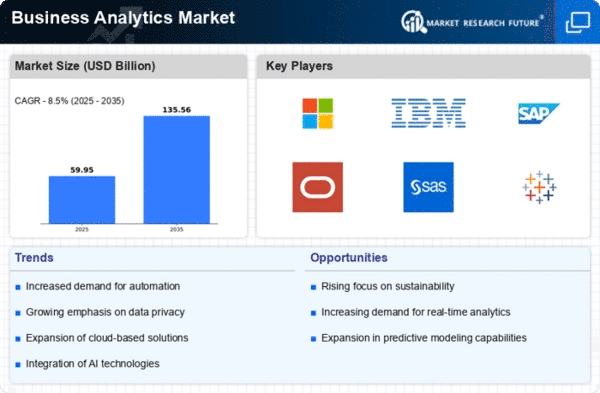Top Industry Leaders in the Business Analytics Market

Competitive Landscape of Business Analytics Market:
The competitive landscape of the Business Analytics market is marked by dynamic trends, robust competition, and strategic maneuvers as industry players vie for dominance in this rapidly evolving sector. The market, driven by the increasing need for data-driven decision-making across diverse industries, is witnessing the deployment of advanced analytics tools and solutions. Key players in the Business Analytics market employ various strategies to gain a competitive edge, with a focus on innovation, partnerships, and market expansion.
Key Players:
- Cloudability, Inc
- EXPONEA, Densify, Inc.
- Google LLC
- Mixpanel, Inc.
- IBM
- SAS Institute, Inc.
- SAP SE
- Tableau Software, Inc.
- Microstrategy Incorporated
- Teradata Corporation
- Oracle Corporation
- Adobe Systems Incorporated
- Qlik Technologies, Inc
Strategies Adopted:
- Innovation and Product Development: Key players consistently invest in research and development to enhance their analytics offerings. This includes the integration of artificial intelligence, machine learning, and predictive analytics capabilities into their solutions.
- Partnerships and Collaborations: Collaborative efforts with technology partners, industry players, and consulting firms are common strategies. These partnerships aim to broaden the reach of analytics solutions and provide clients with end-to-end offerings.
- Market Expansion: Companies often focus on expanding their geographical presence to tap into emerging markets. This involves establishing regional offices, forming alliances with local partners, and customizing solutions to meet specific regional needs.
- Acquisitions: Mergers and acquisitions play a pivotal role in the competitive landscape. Companies seek to acquire innovative startups or established players to enhance their product portfolios and gain a competitive advantage.
Factors for Market Share Analysis:
- Product Portfolio: The diversity and sophistication of analytics solutions offered by companies influence their market share. A comprehensive product portfolio that addresses various analytics needs gives companies a competitive edge.
- Customer Base: The size and diversity of the customer base contribute significantly to market share. Companies that cater to a broad spectrum of industries and have a strong customer retention rate tend to command a larger share of the market.
- Technology Integration:The ability to seamlessly integrate analytics solutions with existing infrastructure and emerging technologies is crucial. Companies that offer flexible and interoperable solutions gain favor among businesses seeking scalability and adaptability.
- Customer Satisfaction: High levels of customer satisfaction, reflected in positive reviews and testimonials, contribute to market share. Satisfied customers are more likely to continue and expand their usage of analytics solutions, enhancing the vendor's market position.
New and Emerging Companies:
- Domo, Inc.: Known for its cloud-based business intelligence platform, Domo is gaining recognition as an emerging player. Its focus on real-time data visualization and collaboration sets it apart in the competitive landscape.
- Looker Data Sciences (Google Cloud): Acquired by Google Cloud, Looker is making strides in the data analytics space. Its platform emphasizes data exploration and collaboration, catering to the evolving needs of businesses.
- RapidMiner, Inc.: Specializing in data science and machine learning, RapidMiner offers a user-friendly platform for building, deploying, and managing predictive models. The company is gaining traction among businesses seeking advanced analytics capabilities.
Current Company Investment Trends:
- Cloud-Based Solutions: Companies are increasingly investing in cloud-based analytics solutions to provide scalability, flexibility, and accessibility. The shift to the cloud allows businesses to leverage analytics without the burden of managing complex infrastructure.
- Artificial Intelligence and Machine Learning: Investments in incorporating artificial intelligence and machine learning capabilities into analytics solutions are on the rise. Companies aim to enhance predictive analytics, automate insights generation, and improve overall data processing efficiency.
- Industry-Specific Solutions: There is a growing trend of companies investing in industry-specific analytics solutions. Tailoring offerings to meet the unique challenges of specific sectors allows vendors to capture niche markets and provide specialized value to clients.
- User-Friendly Interfaces: User experience is a key consideration in current investments. Companies are focusing on developing intuitive and user-friendly interfaces for their analytics platforms, enabling a broader range of users to engage with and derive insights from data.
Latest Company Updates:
Nov 7, 2023: Snowflake acquired data science platform Spot.io for USD 550 million, aiming to simplify data pipeline management.
Dec 12, 2023: Microsoft partnered with Databricks to offer its Azure cloud platform as the preferred infrastructure for Databricks' Lakehouse platform.
Jan 3, 2024: SAP announced a strategic partnership with Qualtrics to combine business intelligence with experience data, enhancing customer insights.
Oct 20, 2023: The rise of edge analytics is predicted to decentralize data processing, enabling real-time decision-making closer to data sources.
Nov 29, 2023: Generative AI is making inroads into analytics, with potential applications in data generation, anomaly detection, and predictive modeling.
Dec 5, 2023: Explainable AI (XAI) is gaining importance to ensure transparency and trust in AI-powered analytics models.










